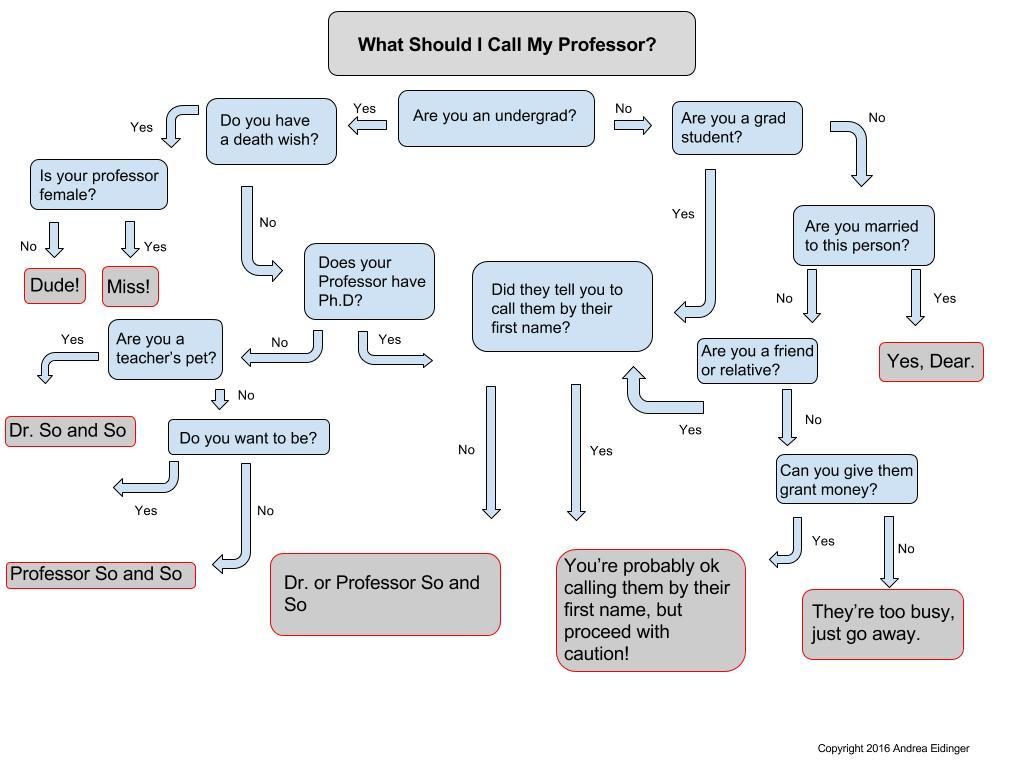
A recent IR Twitter flare-up occurred on a seemingly innocuous topic illustrated by the flow-chart above: what should I call my professor? A PSA from Prof. Megan L. Cook recommended students to address their professors as Professors or Dr., avoiding references to their marital status or first names. Prof. Raul Pacheco-Vega tweeted the following:
I also delete every email that first-persons me on a first email. Them’s the rules. You can decide how you want to be addressed, but I’m the one who decides how *I* want to be addressed.
Dr. Jenny Thatcher and several others disagreed, pointing out that taking offence at an “improper” address is elitist, disrupts collegiality and can potentially push out first-gen scholars or people from backgrounds that do not share the same culture of academic etiquette. For that intervention, Dr. Thatcher endured insults, digs at dyslexia, and threats of getting reported to the police by random Tweeps.
I have been on a bit of a rollercoaster about this issue. When I started my post-doc, it really irked me that my male post-doc colleagues were addressed as Dr. or even Prof. by the students, while I got the first-name basis right out of the park. It did create a feeling that as a foreign woman who speaks accented German I had to work twice as hard to prove that I have the same level of expertise and that I, too, belong in academia. In the German academic culture generally (but not in my Department), titles mean a lot – many professors insist on being addressed as Prof. Dr. Dr. in case they have multiple degrees, many change their IDs to include their titles to make them official parts of their names. Given a ridiculously small number of tenured Professors in relation to the total academic workforce in Germany – a combined 15% (!!!) – it makes the hierarchy even more glaring.
That’s when the picture above went on my office door. Tired of being “Lisa-ed” I thought that the picture would communicate in a joking form that I should be accorded at least the same level of respect as my male colleagues of the same status. But the “Miss” and “Mrs” endured – often just a harmless continuation of school practices most students bring from their schools around the world. At the same time, I added “Dr.” to my Twitter handle – part of a combined online effort of female academics to prove that representation matters and a female academic is also the norm.
Then I got a bunch of woke American graduate students in my class. They insisted on calling me Professor (which is technically illegal in Germany unless the title is officially awarded) or Doctor. Gradually, I stopped turning around at the “Dr. Gaufman” looking for my dad who is a medical doctor and … I stopped caring about it. Of course, I get annoyed when I get a “Hey Lisa, I overslept the class, did I miss anything important?” email, but other than that, it’s strangely … ok.
I realise that this normalisation is a combination of an impostor syndrome and white privilege. If I am at an academic conference, I don’t have to worry about being racially profiled or mistaken for wait staff, which happens to academics of color in places even like an ISA convention. As Dr. Meg Guliford eloquently observed:
It’s not being mistaken for a member of the support staff that troubles me, but what that mistake means. Whether they mean to or not, my fellow academics are betraying a toxic assumption: Even as I move about a university with a messenger bag over my shoulder and a stack of books in my arms, they refuse to see me as a member of the professional and intellectual community I’ve worked to join.
I guess what I am trying to say is that for a lot of people in academia first-name basis can mean something different and potentially exclusionary. I won’t discard an email that addresses me by my first name and I will try to foster collegiality in academia regardless of background. My piece of advice to all those in doubt is: so call us maybe something you would call a white male colleague.
Elizaveta Gaufman is Assistant Professor of Russian Discourse and Politics at the University of Groningen, the Netherlands. She is the author of "Everyday Foreign Policy: Performing and Consuming the Russian Nation after Crimea" (2023) and "The Trump Carnival: Populism, Transgression and the Far Right" (2024).


“They insisted on calling me Professor (which is technically illegal in Germany unless the title is officially awarded) or Doctor.”
In fact, even calling oneself Doctor can be (or maybe used to be?) illegal if the degree is from outside Germany. I remember a story of someone having to remove the “Dr.” on the nameplate next to their office door, and replacing it with “PhD”, because their degree was from a US school.